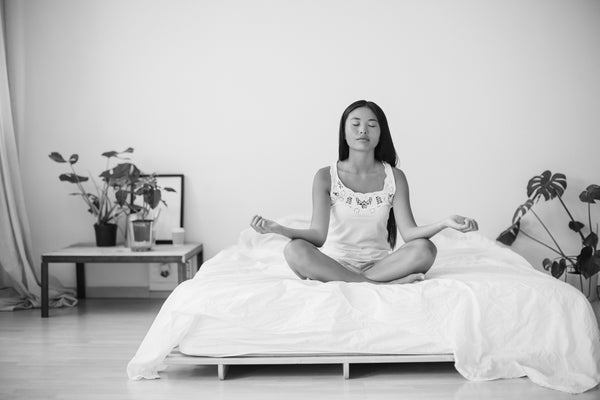Insomnia and sleep apnea - how to treat and sleep better
Do you spend sleepless nights? Do you wake up feeling like you haven't slept at all? You may suffer from a sleep disorder such as insomnia or apnea. If that's the case, there's good news: both have treatment.

Insomnia
Do you spend several whole nights without sleep? You are likely to suffer from insomnia. Knowing the symptoms and possible causes is the first step towards seeking treatment.
What is insomnia? It is a disease?
Insomnia is a sleep disorder not as uncommon as you might think. It manifests itself in several ways, but all of them impede your rest: difficulties in falling asleep; falling asleep, waking up at dawn and not being able to sleep anymore; or difficulty sleeping in general. Insomnia sufferers may feel quite tired when they wake up, but not necessarily – and that doesn't mean they got a good night's sleep.
Insomnia can degrade your energy level, mood, work performance and overall quality of life.
Many people experience insomnia at some time in their lives. These cases are known as acute, or short-term, insomnia and can last for a few days or weeks. May be the result of a high phase. stress or traumatic event. However, some suffer from long-term, or chronic, insomnia that lasts a month or more. These cases can have more profound causes associated with them and, if left untreated for a long time, have serious consequences for your health.
Symptoms and Causes
Among the symptoms of insomnia is difficulty falling asleep, waking up (once or several times) during the night, falling asleep, but waking up at dawn and not being able to sleep anymore, not feeling rested when waking up, daytime tiredness or drowsiness, irritability, depression, anxiety, difficulty focusing, memory problems, increased errors or accidents caused by distractions, among others.
What can cause insomnia? Insomnia can be the main problem or it can be associated with other conditions.
There are several common causes and the degree of impact varies from person to person. O stress (worries about work, school, health, finances, family, …) or traumatic events (death or illness of a loved one, divorce, job loss, …) can keep your mind active at night, making sleep difficult.
Anything that disturbs the body's circadian rhythm can cause insomnia, such as traveling in different time zones (the famous jet lag), changing work shifts frequently, among others.
Bad sleep habits are also a cause of insomnia. Irregular bedtimes, naps, stimulating activities before bed, an uncomfortable sleep environment, using the bed for work or study, intensive use of electronic devices (such as the smartphone, video game consoles, televisions) before bed – they can all interfere with your sleep cycle.
Eating too much and too close to bedtime, the use of certain medications, caffeine, nicotine and alcohol are also possible causes.
Other common causes of insomnia include mental health disorders (which can appear before or after insomnia), sleep-related disorders (sleep apnea, restless legs syndrome, …) and some medical conditions. In the case of this last factor, its treatment can help improve sleep, but insomnia may persist after the medical condition improves.
How to prevent and treat insomnia
In less severe cases, insomnia can be prevented or even treated with some ease. Instilling good habits can help promote sound sleep.

You must set a time for bedtime and waking up, and stick to it every day, including weekends, holidays, and vacations. Stay active: physical exercise is essential. Avoid or limit naps, caffeine and alcohol. Eliminate nicotine from your life. Avoid large meals close to bedtime. Check whether the medications you are taking contribute to insomnia. Creates a comfortable environment in the bedroom, conducive to sleep, and where electronic equipment should not be included, except the essential ones (alarm clock, for example). Create a relaxing bedtime ritual such as taking a hot bath, reading or listening to soft music.
Meditation
Meditation is a practice that helps the practitioner to center and is beneficial in many ways. One of them is that it is a natural, easy and medication-free method for treating insomnia. Studies indicate that meditation can help improve sleep quality as well as make it easier to fall asleep and continue to sleep. It can also help with symptoms of illnesses that can contribute to insomnia, which include stress, anxiety, depression, digestive problems, pain, among others.
Sleep Apnea (Obstructive Sleep Apnea Syndrome)
What is sleep apnea? It is severe? It can kill? What are the possible consequences?
Sleep apnea, or Obstructive Sleep Apnea Syndrome, is an obstructive respiratory disease characterized by recurrent episodes of pharyngeal collapse during sleep. In addition to causing the characteristic snoring, apnea is characterized by noises and interruptions in breathing that are repeated at least five times in a period of 60 minutes.
More than bothering the partner you sleep with, this syndrome can lead to serious cardiovascular problems, among other diseases. Respiratory arrests cause decreased blood oxygenation and small unconscious awakenings during the night, that is, patients can sleep, but the brain does not rest.
How to Diagnose Sleep Apnea: Symptoms and Causes
Obstructive Sleep Apnea Syndrome manifests itself both when the patient sleeps and when he is awake. During sleep, symptoms include snoring, pauses or stops breathing (such apneas), wheezing, insomnia or restless sleep, awakenings with a feeling of suffocation and the need to urinate.
When awake, the patient may experience excessive sleepiness (chronic fatigue or falling asleep in various everyday situations, such as watching television), a feeling of non-restorative sleep, decreased memory or concentration capacity, morning headache, among others .
Among the risk factors are overweight, smoking, excessive alcohol, excessive or misuse of sedatives, or something as simple as sleeping on your back, among others.
How is sleep apnea diagnosed? Diagnosis is made by polygraphic recording of nocturnal sleep. The patient spends the night connected to a device that records parameters such as heart rate, brain activity, eye movement, breathing and the level of oxygen in the blood.
Sleep apnea is curable: how to treat
Every person is different and may have different symptoms. Of course, the same applies to treatment. If you suffer from sleep apnea you can rest assured: there is a cure!
The recommended measures include reducing weight, not drinking excessively – not even after lunchtime, not smoking, not taking sleep medications (a decision that must be confirmed with the doctor) and trying to obtain the number of hours of recommended sleep.
In addition, and depending on the case, it is likely that the treatment will include a specific intervention, which may include the use of a device during sleep, which provides air with a positive pressure in the upper airways, through a mask. This action is indicated for moderate and severe cases. In mild cases surgery may be recommended.
A timely diagnosis and correct treatment allows for a significant improvement in the quality of life of patients.
Sleep cycle
We spend a third of our life sleeping. This is an absolutely essential function that interferes with many other areas of our lives. We all have a specific need for sleep and this need must be conscious and respected in order to maintain the balance of our biological system.
A quality sleep for an adequate time can provide several health benefits. Among them, maintaining a healthy weight, reducing the risk of developing diseases such as diabetes and cardiovascular problems, greater ease in maintaining concentration, reducing the stress, reduction of the probability of accidents caused by tiredness and good mood.
Getting enough sleep not only feels better overall, it also increases your chances of living healthier and more productively.
How many hours should we sleep a day? How to calculate sleep cycle phases by age (from babies to the elderly)
How many hours of sleep do we need? Experts recommend an average of eight hours of quality sleep a day for adults. Naturally, this number varies according to age, as well as the developmental needs of each one.
These are the recommended hours of sleep according to age:
- Baby from 0 to 3 months: 14 to 17 hours
- Baby from 4 to 11 months: 12 to 16 hours
- Child from 1 to 2 years old: 11 to 14 hours
- Child from 3 to 5 years old: 10 to 13 hours
- Child from 6 to 13 years old: 9 to 11 hours
- Adolescent from 14 to 17 years old: 8 to 10 hours
- Adults from 18 years of age: 7 to 9 hours
- From 65 years old: 7 to 8 hours
These are general recommendations only, but it will be more important to understand your own sleep needs and adjust your schedule accordingly.
How many hours should we sleep to gain muscle mass? And to lose weight?
The answer is the same for both of these questions: you should get the recommended sleep hours for your age. In fact, this recommendation is applicable even if you are not trying to lose weight or gain muscle mass, since sleeping the recommended hours of sleep is essential for a healthy lifestyle. Studies prove that lack of sleep is harmful for those who want to build muscle mass and also for those trying to lose weight, often causing the opposite result to the intended.
Conclusion: the importance of sleep in health
Getting quality sleep is critical in many aspects of our lives. It can prevent and sometimes even treat other health problems that arise as a result of lack of sleep. Anyone suffering from sleep disorders such as insomnia or apnea can and should seek treatment. We hope we have helped with your queries and encouraged you to find treatment for whatever you need.

2 comments
Olá Lina, obrigado pela visita ao nosso blog!
É tão importante ter um sono de qualidade para enfrentar o dia a 100% 💪 e obviamente cuidar da nossa saúde a longo prazo.
Recomendamos também o artigo “Exercício antes de dormir: 5 exercícios que ajudam a dormir melhor” que pode ser consultado através deste link:
https://colmol.pt/blogs/artigos/exercicio-antes-de-dormir-5-exercicios-que-ajudam-a-dormir-melhor
Depois diz-nos o que achaste! 😊
Obrigada. Li, compreendi e vou procurar cumprir o que aconselham